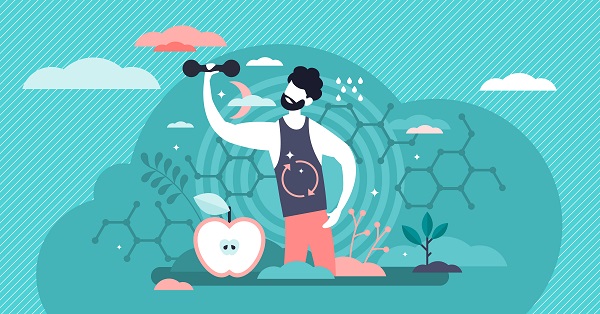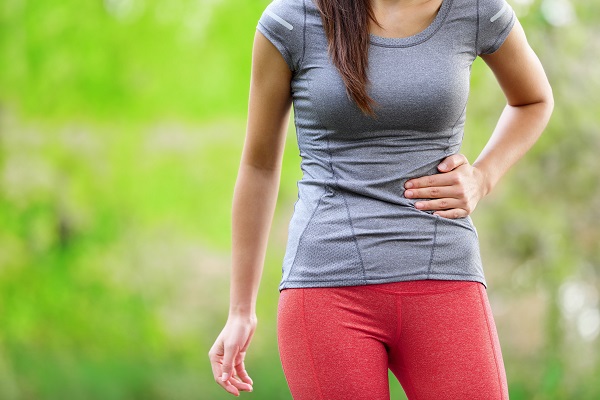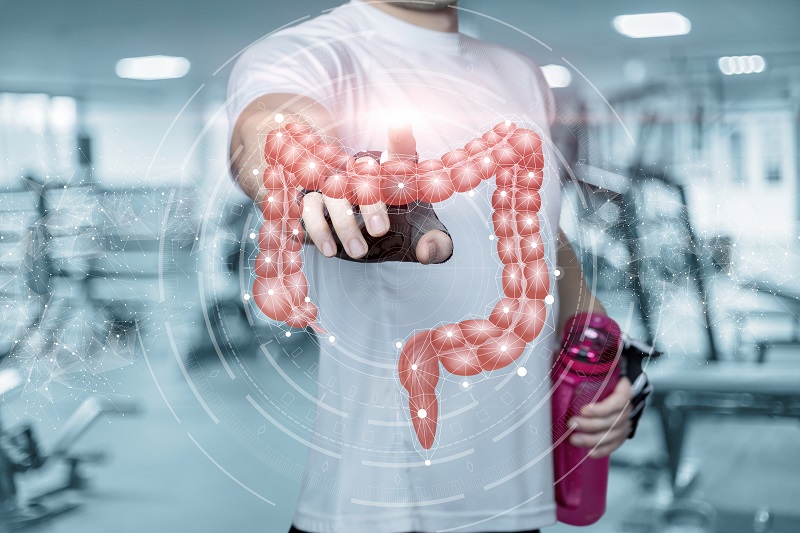Don’t go swimming after you eat. Avoid exercising on an empty stomach. Make sure you drink lots of water. You’ve probably heard these and other statements from your parents when you were young, a friend or even your phys ed teacher. Are these just old wives’ tales or does exercise affect your digestion?

What is digestion?
There’s no doubt about it, the more active you are, the more food you need. That’s because food is the fuel (calories) you need to do any movement; from keeping your heart beating to running upstairs. But food needs to be broken down before it can used or stored for energy. This process is called digestion.
Your digestive system runs all the way from your lips through your stomach to your intestines finishing at the end of rectum. This is the path your food takes when you eat, but other organs are needed including the brain, liver, pancreas and gallbladder.
The digestive process begins before food even touches your lips. As soon as you think about food, your mouth will start to produce saliva (think of Pavlov’s dog). Enzymes in salvia, in addition to chewing, begin breaking down food in your mouth. Once swallowed, food passes through your esophagus into your stomach where it mixes with stomach acid, bile and enzymes before passing to the small intestine.
Food moves through your small intestine by peristalsis. Peristalsis is the contracting and relaxing of muscles that squeeze your intestine to push food along. It’s in the small intestine where your food is further broken down and absorbed into your body. It gets help from water absorbed from your blood and bacteria living in your intestine. Whatever remains goes to the large intestine for possible absorption or becomes stool for excretion.

How Exercise Helps Digestion
Exercise helps you digest foods in a number of ways. Despite warnings from mom not to exercise after a meal, this might actually be the best time to do it. Going for a light to moderate walk can speed up emptying of the stomach. This is likely due to the increased blood flow to the intestines aiding in peristalsis. But even if you aren’t active after a meal, people who exercise regularly have faster digestion times than those who don’t.
Activity after a meal also helps metabolize blood glucose. After a meal, it’s natural for blood glucose to rise as food is broken down and absorbed into your body. However, prolonged sitting after a meal can delay glucose from being taken up and used by the liver, muscles and other organs. And sitting for long periods can increase your chances for type 2 diabetes. Engaging in activity can reduce the time it takes for glucose to be cleared from your blood. And it doesn’t need to be a lot, as little as two minutes can make a difference compared to continued sitting.
Over time, exercise can change the bacteria in your intestines in a good way. Termed the microbiome, your intestines have trillions of bacteria in them. These bacteria help you digest food, assist metabolism and resist infection. Active individuals tend to have greater diversity in their microbiome and also more of the health-promoting bacteria. Great diversity is good, as a lack of diversity may play a role in one’s risk for disease. And as littles as six weeks of exercise in sedentary people was enough to result in favourable changes in the microbiome.

When is exercise a problem?
Exercising at a high intensity after eating, though, may be problematic. Exercise requires blood to be directed to the working muscles to deliver oxygen and other nutrients. At the same time, if you have food in your stomach, blood also needs to be directed there as part of digestion. When you do light or moderate intensity exercise, there’s enough blood to go around.
But high intensity exercise requires more blood to the working muscles, which can slow or halt the digestive process. If it’s still early in the digestive process, you may experience feeling bloated, nausea, cramps and sluggishness affecting your performance. Symptoms tend to be more common in running compared to cycling or swimming. This may be due to the jarring affect of running (or similar activities).
Whether you experience any symptoms also depends on what type of meal it is. Meals high in fat, protein and fibre take longer to digest than simple carbs or smoothies. Smoothies, due to the blending, have reduced the amount of fibre allowing you to digest faster. If you’re going to do intense exercise for an extended period of time, it may be wise have a snack about 30 minutes before your session.

Do I need to eat or drink during exercise?
When exercising you burn calories and generally sweat. So it might make sense that you need to replenish your lost calories and water by drinking or eating during exercise. Eating during exercise is only necessary for exercise of a certain duration (> 1 hour) and intensity (moderate-vigorous or greater). Therefore, for most people, this won’t be necessary. This is because your body has sufficient stores (carbohydrate and fat) to provide the energy needed for up to two hours of moderate exercise.
Whether you need to drink water while exercising will depend on the weather conditions, how much you sweat and how long/intense your exercise is. In hot conditions, you’ll sweat more and it’s the evaporation of your sweat that helps cool you down. If it’s hot and humid, that sweat will just drop off of you and do no good, forcing your body to sweat more (and lose more water). If your exercise sessions are less than an hour, you probably won’t need water at the time, but you will need to drink after you’re done. It may take trail and error to figure out how much water you need, as having too much water can make you feel bloated as it sits sloshing around in your stomach.
If you like this post, don’t forget to subscribe to my blog by clicking the FOLLOW button at the top of the right panel.
Enjoy listening to podcasts? Check out my show How to Health. A podcast about you and your health.


Leave a Reply